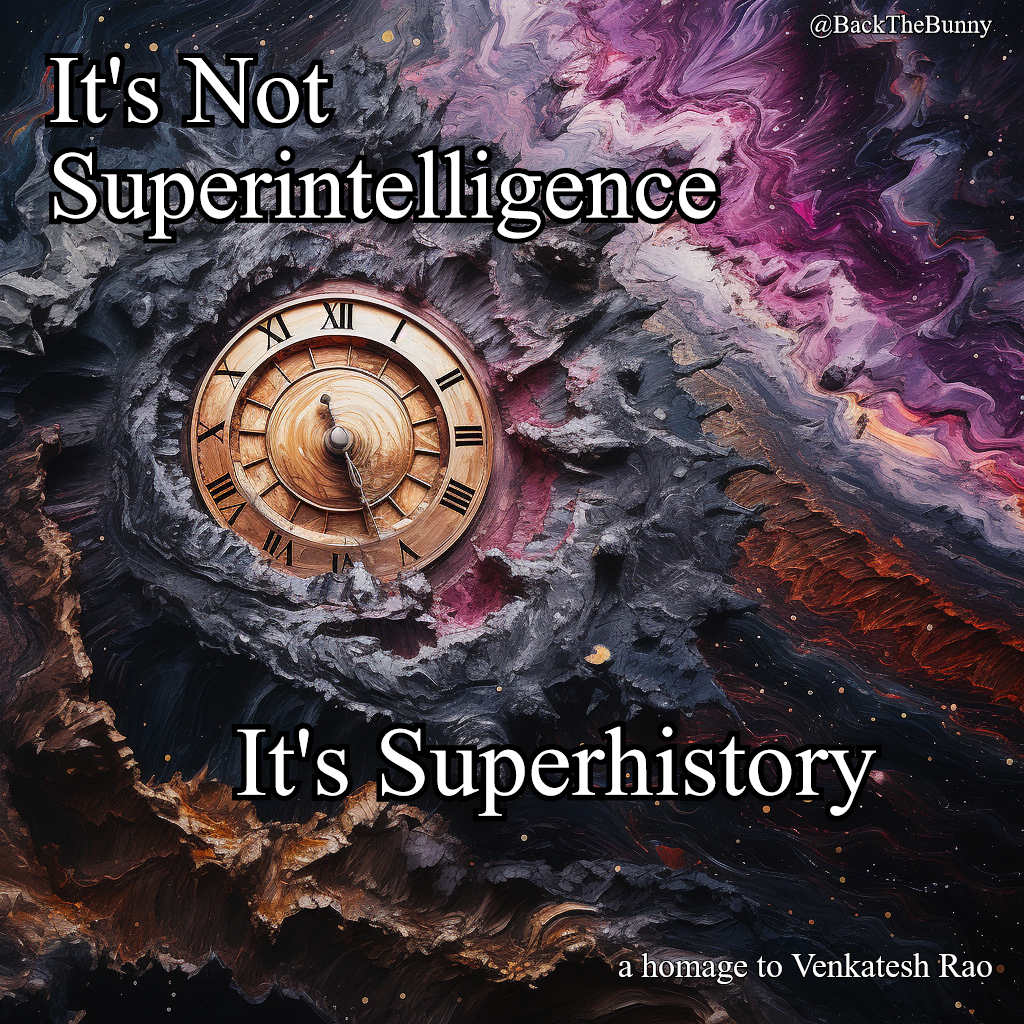AI is not a young technology. It’s an ancient one. AI is more appropriately understood as superhistory, not superintelligence This has application beyond AI. It changed how I view myself and those around me. You are a centaur.
This idea came from one of the most influential essays I’ve ever read: Superhistory, Not Superintelligence, by Venkatesh Rao. This is a homage to his work. I want to increase the surface area of his brilliant conceptualization. I’ll share the original piece at the end.
---
AI is better understood as AT: Artificial Time
Something exposed to vast amounts of data, essentially all of recorded human history, resides in superhistory. AI is an organism trained on and drawing from centuries of information.
data time > linear time
In data years, AI is an ancient being.
"Data aging" is understood through a lens of data exposure, not temporal passage. Example: if I can impart 5 years worth of experience to you, you just got 5 data years older. AI can age centuries in days. It can do this due to its vastly superior data surface area. I, as a human, can only consume information one. slow. singular. human reading at a time. My surface area of info exposure is constrained by my meatness. In a way it's beautiful, the journey is what makes life worth living. Not autistic data maximizing. But AI doesn't have this nostalgic approach.
I can't pool my brain and share it with you. Pre-internet, humans had just 1 human's life worth of information. But AI can pool it. GPUs can take all human documentation and run it through The Machine. AI's data surface area has no limit or bias. AI has corpora of data spanning the entirety of written history to learn from, retained with near perfect recall. ChatGPT makes the pyramids look like infants. View aging not from a 'getting older' physical, years-based one... but from an informational one. Data aging.
---
WHAT IS A CENTAUR
The disrupting takeaway from this: for humans, older is not necessarily wiser. Don't view time as linear. View it as your total information exposure.
Data aging > human aging
A 30 year old augmented by the internet may be 170 years old, in nominal human years.
To illustrate: how old was Magnus Carlsen when he became world chess champion? The answer isn't 22. When Magnus won, it's reported he played "older" in a way (the same was said about AlphaGo when it defeated Lee Sedol at Go). That's because Magnus was raised by ancient trainers.
Magnus grew up playing against machines that solved chess. Tutored by an ancient organism that taught him the most optimum ways to play. Magnus is AI augmented. When he won the championship he was 22 human years old, but he was maybe 250 years old in chess terms. A modern player trained with AI has a true "player age" that is some function of their biological age and data age. So by virtue of being trained by an ancient teacher, Magnus Carlsen looked like a kid, but in chess years was possibly decades or centuries older than opponents.
Instead of playing one person at a time and gaining exposure to one human's worth of experience, he learned from a machine that was trained on the sum of all experiences. This is what a centaur is: A human augmented by artificial time. Data aged beyond your physical years.
How else can you apply this concept? Centaurs (machine augmented humans) change what it means to age. Lived human experience, expressed in linear time (years) is rather data poor. Most of our lives are informationally empty. Consider the person who never leaves his hometown...
He goes to school, gets a job, a family, and never leaves where he grew up. He effectively stops being exposed to new experiences and info at... 35? When he's 55, he doesn't have 20 more years of data... He has 20x reinforcement on 1 year of data. On repeat. Forever.
He mostly stopped educating around 25. Learned things about life, family, and work over the next 10ish years. And then after that, it was kinda the same loop. I understand this disregards the love and beauty found within that loop. But still...
It was unsettling to realize how informationally hollow human years are in data terms, especially when you enter your terminal loop. A 75 year old that's repeated 85% of the same pattern for 40 years, really isn't much older than 35 in data years. This was a transformative thought for me. It's why I'm sharing this. It's altered how I view someone's capabilities and wisdom. Including myself and those around me. I now tend to understand people in data years when judging the things we all judge about each other.
Augmenting humans with tools like Google and AI can accelerate our data, or experiential, age. You can also view this as "prosthetic experience". Someone enhanced by these tools can posses greater knowledge and wisdom than their biological age suggests. If you've been using Google the last 20 years, you've accessed several human lifetimes of info compared to someone who had to go to the library and laboriously search through stacks of paper to figure out one thing. If you exist in certain esoteric nooks of Twitter, you're probably at least a data centenarian.
Every time you learn something with ChatGPT or Google that your Uncle Milford would have said "meh" and never looked up, you're data aging in hours, maybe days, within seconds. My personal goal is to data age around 1-3 years per day (ADHD grindset)!
This may speak to why some boomers feel child like. They were raised in human time, and are weakly digitally augmented. It's palpable at times. Younger generations will have increasingly larger information exposure relative to prior ones. They’ll be more centaur-like. Older data ages.
What's also exciting (scary?) is AI can create its own history. Once AlphaGo was trained how to play Go, it then mostly played itself to keep learning. Taking the concept of superhistory to the next level, creating its own Artificial Time. Human-made data will soon be the minority of data AIs learn with.
Superhistory, Not Superintelligence is much longer and touches on other adjacent topics, but I feel they're all in service of the core takeaways shared in this thread. Thank you again to Mr. Rao for sharing his creative and insightful work.
If you enjoyed, please do subscribe (and share with your friends. Thank you.


